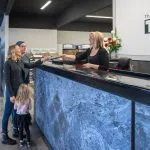
Quebec sugar shack owners say the COVID-19 pandemic saved the iconic industry
MONTREAL — Sugar shack owners across Quebec are reopening their dining rooms for the first time since the start of the COVID-19 pandemic, and strangely, they are crediting the novel coronavirus with revitalizing their industry.
The spring sugar shack experience — eating beans and ham at long tables with strangers, enjoying tractor rides through the melting snow and nibbling snow-chilled maple syrup on wooden sticks — was on the decline before the pandemic. But two years of COVID-19 lockdowns have forced the traditional industry to reinvent an outdated business model, and some say it is more sustainable than before the health crisis hit.
“We’ve been doing the same thing for 50 years,” Camélie Gingras, manager of sugar shack La Goudrelle in Mont-St-Grégoire, Que., southeast of Montreal, said in a recent interview. “When I told my 84-year-old grandfather that we were going to do boxed meals for online orders, I can tell you, oh boy, he looked at me with a question mark on his face.”
Gingras and other owners of sugar shacks — know as cabanes à sucres in French — credit the industry’s resurgence to an online retail platform launched in February 2021 that allows them to sell take-home versions of the traditional spring meals. Created by the association that represents the province’s sugar shacks, the platform — Ma Cabane à la Maison — ended up reinventing the experience.



